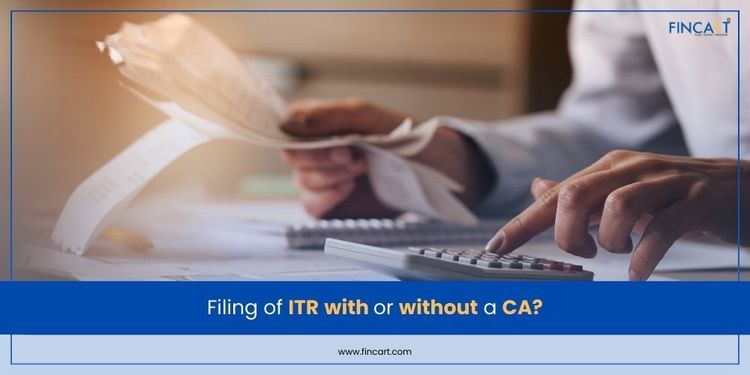Table of Contents
ToggleFiling ITR to date seems to be a hassle process for many taxpayers. Every year there is an addition of new taxpayers, while existing taxpayers may enter a new tax slab. However, the confusion remains the same every year!
Over the years, the IT department has made all the services available online to make the tax process more efficient. A question that arises is whether or not one can file their own taxes. Is there a need for an additional hand like CA (Chartered Accountant) for filing taxes?
Well, in this blog, we’ll be answering questions for both of the above-mentioned scenarios.
Before that, let me help you brush up with the tax slabs: Old tax regime/ New tax regime!

Now the tax slabs are brushed up, let’s move forward!
Do it yourself!
If you are someone who believes that you have 2 KEY aspects to file your taxes on your own, then gladly move forward with it!
What are the 2 KEY aspects you ask?
- Knowledge
- Time
1. “Knowledge is of no value if not put to use”
If you have a single source of income, predominantly from salary then you can easily file your taxes. If you choose to file your taxes on your own, it is essential to ensure you have the necessary knowledge and resources to do so correctly. Having a good understanding of tax laws and regulations is crucial for filing your taxes accurately.
Every year new budget comes up with a few changes in the tax rules, thus it is crucial to stay updated if you want to file your own tax returns. Tax laws are subject to change, and staying informed about the latest updates can help you take advantage of deductions, credits, and exemptions that you may qualify for.
2. “Time is the most valuable asset”
Before agreeing on the fact of tax filing taxes on your own, just ask yourself this question, “Do I really have the time to plan & file my taxes on my own?
If your response is Yes, then & you think it is a manageable affair then gladly move forward. This is because filing taxes requires a certain amount of time and effort to gather the necessary documents, understand the tax laws, and accurately complete the required forms.
Depending on the complexity of your financial situation, you may need to invest several hours or even days to complete the process thoroughly. Rushing through the process can lead to mistakes or omissions, which may result in penalties or audits.
When should you hire a CA?
1. Business income
Self-employed individuals or business owners might need to keep a book of accounts. In addition, if the company’s turnover exceeds Rs 1 crore (or if the professional’s gross receipts are greater than Rs 50 lakh), it must be compulsorily audited by a CA. Tax rulings and regulations are constantly changing, which means a CA can help you save on taxes and make necessary filings, and advance tax payments before the deadline.
2. Complex Deductions and Credits
Certain deductions and credits require a deep understanding of tax laws and regulations. If you have complex deductions or credits such as those related to education expenses, medical expenses, or investment losses, a CA can help maximize your tax savings while ensuring compliance.
3. Tax Planning and Strategy
A CA can provide valuable advice and guidance in tax planning throughout the year. They can help you identify tax-saving opportunities, structure transactions efficiently, and ensure compliance with changing tax laws. A last-minute tax filing can be disastrous, as any wrong calculation could lead to its rejection by the IT authorities. There is a heavy penalty of Rs 10,000 or more if you fail to file your return by the due date. It is better to hire a CA if you lack the time and resources to do the tax computations.
4. Tax Disputes or Audits
If you are facing a tax audit or dispute with tax authorities, a CA can provide professional representation, handle communications with tax authorities, and help navigate the audit process.




